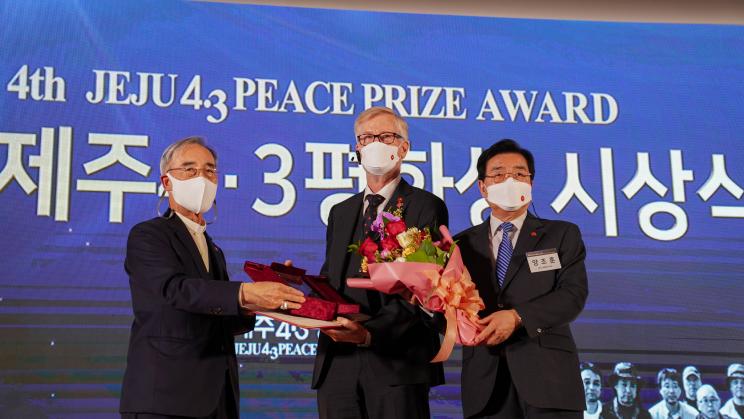
Dan Smith, SIPRI Director, has been awarded the fourth Jeju 4·3 Peace Prize for his research and work on security, reconciliation and peacebuilding in many parts of the world, especially including the Korean Peninsula. The prize was presented in person on 30 November at the Jeju KAL Hotel, Jeju Island, South Korea.
‘I can hardly express how honoured I am today and how grateful I am to receive the prize. This is a moment I will always treasure’, said Smith in his acceptance speech. He expressed his long-term interest in the Korean Peninsula, adding: ‘When I joined SIPRI, this was the first time I was able to make a small contribution to the prospects for peace in this part of the world. It was an immediate priority for me.’
During his speech, Smith referred to the 1948–49 Jeju massacre and emphasized the fundamental importance of uncovering the truth about such events. Commenting on international security today and SIPRI’s role, he said: ‘The security horizon today and looking ahead is complicated, in a way that was perhaps unimaginable back in the 1960s when SIPRI was founded. Yet our mission is still to assemble and analyse the facts, in order to generate ideas for how to arrive at a better world. And the mission remains valid. It also remains true that carrying out that basic mission lets SIPRI convene both big public events and the smaller, quieter activities. And it is another lasting truth that with knowledge and understanding comes the motivation to challenge and to seek change and progress. Our greatest hope lies in well-informed public movements for environmental responsibility and peaceful change.’
Watch the livestream of the ceremony here.
About the Jeju 4.3 Peace Foundation and Peace Prize
The Jeju 4.3 Peace Foundation awards the Jeju 4·3 Peace Prize. ‘Jeju 4.3’ refers to the start of an uprising on the island of Jeju in 1948–49 and the brutal response by security forces that killed 25 000–30 000 people. The foundation was established to seek full transparency about those events and honour the victims and their bereaved families. It aims to contribute to the improvement of human rights, democracy and national reconciliation. The Jeju 4·3 Peace Prize was instituted in 2015 and is awarded biennially to individuals who have contributed to the advancement of world peace, human rights, democracy and social integration.
More information about the Jeju 4·3 Peace Prize and the Jeju 4·3 Peace Foundation is available here.